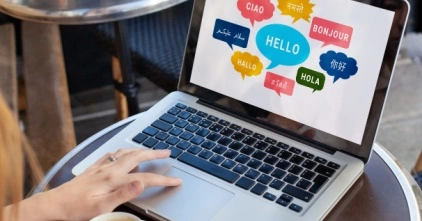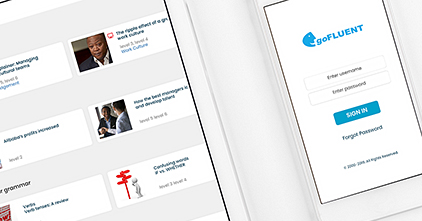As remote and hybrid work models become the norm, finding ways to maintain smooth collaboration among geographically dispersed teams is more important than ever. Simple practices like casual check-ins, language training, and regular assessments can go a long way in keeping your global team connected and confident.

Despite conversations around return-to-office mandates, 64% of company leaders say they still prefer to have hybrid work models. This is not surprising given the tremendous benefits that both employees and organizations get from having remote work available as an option.
One of the pros of having a remote workforce is the increased access to the global talent pool. Employers can now hire the best talent anywhere from around the world. So not just remote teams become more common, multilingual teams do too.
While this offers a great solution to labor shortages, it also comes with unique communication challenges. Remote work environments often limit the casual, spontaneous interactions that help language skills flourish. This makes it essential for organizations to adopt intentional strategies to maintain and even improve these skills.
Why Maintaining Language Skills in Remote Teams Matters
Strong language skills are the backbone of effective communication, especially for remote and multilingual teams. They minimize misunderstandings, ensure smoother workflows, and enhance collaboration across cultures. Without regular practice and proper support, language proficiency can decline, leading to inefficiencies, miscommunication, and even friction among team members.
In today’s fast-paced business environment, strong language skills can directly impact a company’s bottom line. Teams with strong communication abilities show higher productivity rates, faster completion times, and better client satisfaction scores. This becomes even more important in a virtual setup where communication happens mainly through digital channels where every written and verbal interaction counts. When team members are aligned and can express themselves confidently in a shared language, they are more likely to contribute ideas during meetings, participate in projects, and take on leadership roles. This increase in engagement can lead to better innovation, stronger team bonds, and overall improved employee retention rates.
Ways to Maintain and Improve Language Skills in Remote Teams
Maintaining language skills in a remote team is about creating opportunities for growth and ensuring language abilities align with business goals. Here are some effective strategies:
Regular Check-ins and Language Practice Sessions
Research shows that regular practice and immersion are critical for retaining language skills. Remote teams can organize virtual practice sessions, such as informal check-ins within the team, or more structured learning meetups like Conversation Classes.
Live sessions through Conversation Classes bring together learners from around the world creating an immersive language learning environment where employees can engage in natural conversations about various topics. This can help them develop natural fluency and grasp language nuances that can’t be learned in training courses alone. Employees can pick up authentic expressions, improve pronunciation, and learn to think on their feet in their target language.
Engaging in regular conversations, even virtually, helps employees turn new vocabulary into practical use. This practice builds confidence and keeps communication clear and effective.
Business Language Training Programs
Structured training programs are another cornerstone for maintaining language skills. Personalized courses tailored to an employee’s role or industry can deliver big results. Platforms like Language Academy provide personalized learning paths, industry-specific vocabulary, and interactive exercises. The platform also offers different learning options, including Individual Lessons, Group Lessons, and Conversation Classes.
For employees preparing for high-stakes situations like board presentations or international client meetings, Individual Lessons can provide a focused one-on-one session with a professional trainer. These personalized sessions will help perfect industry-specific terminologies, presentation skills, and cultural nuances that are especially important for senior roles.
Team dynamics thrive when different departments can collaborate effectively and overcome language barriers. Group Lessons create a space where different departments can practice real business scenarios together from project planning meetings to strategic discussions. This collaborative environment strengthens both language skills and team bonds.
These programs use role-playing exercises and practical assignments to simulate real-world business scenarios, making the lessons both relevant and practical for everyday workplace situations. Progress tracking also ensures that the skills employees develop aren’t just theoretical but applicable to their daily work tasks.
Assessing Language Skills Regularly
Conducting annual performance reviews is a standard for organizations to help employees align their professional skill development with organizational goals. Why not apply the same principle to language skills? Regular language assessments can ensure that your team’s language and communication skills stay on point. It plays a vital role in career advancement, especially in remote teams where language proficiency can greatly impact promotions and leadership opportunities.
Doing quarterly or annual evaluations of language proficiency can help identify both immediate language needs and long-term potential. High-performing employees can demonstrate their readiness for global or cross-cultural roles through recorded language progress.
As an example, goFLUENT’s Language Assessment solution evaluates not just core language skills like reading and listening but also speaking proficiency. This dual focus ensures employees are equipped with the verbal communication skills essential for leadership, collaboration, and client interactions.

The Role of Leadership in Language Development
Leaders play a critical role in maintaining language skills within remote teams. By prioritizing effective communication as a key aspect of team success, they create a culture that values and supports continuous learning. More than just improving business communication, language training programs serve as a powerful tool for keeping remote employees engaged and motivated in their professional development journey.
When leaders actively invest in employees’ language skill development, whether through training, team language sessions, or recognition of progress, they show their commitment to their team’s long-term development. This investment particularly resonates with remote employees who might otherwise feel disconnected from traditional career development opportunities.
Regularly checking in on team language needs, either through feedback sessions or surveys, ensures that no skill gaps go unnoticed. When leaders take an active role in promoting language development, they not only reinforce its importance, they also create pathways for continuous growth that keep remote teams confident, motivated, and engaged.
Building Stronger Remote Teams Through Language Skills
In today’s global and remote workforce, effective communication isn’t just a nice to have, it’s now a necessity. For remote and multilingual teams, maintaining strong language skills makes sure that everyone can collaborate seamlessly and confidently. Simple steps like regular practice, tailored language training, and consistent assessments can make a world of difference in keeping your team connected and thriving.
Investing in language skills is an investment in your team’s growth and success. With the right tools and strategies—like goFLUENT’s innovative language solutions—you can empower your workforce to communicate better, work smarter, and achieve more together.
Ready to unlock the full potential of your remote team?



